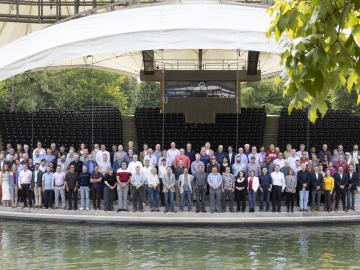
Filter News
Area of Research
News Type
News Topics
- (-) Artificial Intelligence (77)
- (-) Big Data (45)
- (-) Biomedical (42)
- (-) Critical Materials (5)
- (-) Fusion (38)
- (-) Security (16)
- (-) Space Exploration (13)
- (-) Statistics (2)
- 3-D Printing/Advanced Manufacturing (56)
- Advanced Reactors (12)
- Bioenergy (68)
- Biology (80)
- Biotechnology (25)
- Buildings (30)
- Chemical Sciences (35)
- Clean Water (16)
- Composites (11)
- Computer Science (111)
- Coronavirus (19)
- Cybersecurity (14)
- Education (2)
- Emergency (3)
- Energy Storage (32)
- Environment (116)
- Exascale Computing (51)
- Fossil Energy (6)
- Frontier (44)
- Grid (32)
- High-Performance Computing (81)
- Hydropower (6)
- Isotopes (33)
- ITER (4)
- Machine Learning (37)
- Materials (51)
- Materials Science (55)
- Mathematics (8)
- Mercury (7)
- Microelectronics (3)
- Microscopy (23)
- Molten Salt (2)
- Nanotechnology (17)
- National Security (60)
- Neutron Science (82)
- Nuclear Energy (66)
- Partnerships (36)
- Physics (34)
- Polymers (9)
- Quantum Computing (35)
- Quantum Science (48)
- Simulation (42)
- Software (1)
- Summit (40)
- Transportation (30)
Media Contacts

Researchers at Oak Ridge National Laboratory used the Frontier supercomputer to train the world’s largest AI model for weather prediction, paving the way for hyperlocal, ultra-accurate forecasts. This achievement earned them a finalist nomination for the prestigious Gordon Bell Prize for Climate Modeling.

A team of researchers used the Frontier supercomputer and a new methodology for conducting a genome-wide association study to earn a finalist nomination for the Association for Computing Machinery’s 2024 Gordon Bell Prize for outstanding

Kathryn McCarthy, director of the US ITER Project at the Department of Energy’s Oak Ridge National Laboratory, has been awarded the 2024 E. Gail de Planque Medal by the American Nuclear Society.

A multi-institutional team of researchers led by the King Abdullah University of Science and Technology, or KAUST, Saudi Arabia, has been nominated for the Association for Computing Machinery’s 2024 Gordon Bell Prize for Climate Modelling.

Researchers led by the University of Melbourne, Australia, have been nominated for the Association for Computing Machinery’s 2024 Gordon Bell Prize in supercomputing for conducting a quantum molecular dynamics simulation 1,000 times greater in size and speed than any previous simulation of its kind.

Biochemist David Baker — just announced as a recipient of the Nobel Prize for Chemistry — turned to the High Flux Isotope Reactor (HFIR) at Oak Ridge National Laboratory for information he couldn’t get anywhere else. HFIR is the strongest reactor-based neutron source in the United States.

To bridge the gap between experimental facilities and supercomputers, experts from SLAC National Accelerator Laboratory are teaming up with other DOE national laboratories to build a new data streaming pipeline. The pipeline will allow researchers to send their data to the nation’s leading computing centers for analysis in real time even as their experiments are taking place.

Prasanna Balprakash, director of AI programs for ORNL, discussed advancing climate and weather research through high performance computing and artificial intelligence as part of a September 18 panel for the United States Senate.

The Smoky Mountain Computational Sciences and Engineering Conference, or SMC24, entered its third decade with the 21st annual gathering in East Tennessee.

A new Global Biomass Resource Assessment developed by ORNL scientists gathered data from 55 countries resulting in a first-of-its kind compilation of current and future sustainable biomass supply estimates around the world.


